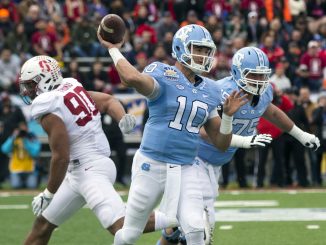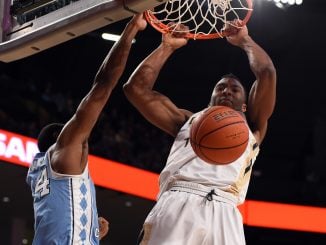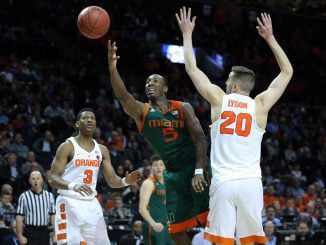CHAPEL HILL In its public release of the response to the Amended Notice of Allegations Tuesday, UNC claimed the NCAA was outside its jurisdiction when it levied some of the five Level I violations against the university for its long-running academic scandal.UNC submitted the response to the NCAA Monday and released the document Tuesday.While the university accepted two of the five violations without argument, it is fighting the two most serious accusations in the lack of institutional control and the failure to monitor charges. UNC also called for less-serious violations relating to former professor and women’s basketball academic advisor Jan Boxill’s involvement.”We worked long and hard studying and trying to decide what should and shouldn’t be a bylaw and what is and is not in the manual,” said UNC Athletic Director Bubba Cunningham on a teleconference Tuesday afternoon. “We understand and have said for quite some time, the rigor of our classes is something we’ve worked with SACS, but just because it doesn’t meet our normal standards doesn’t mean it’s a violation of a bylaw.”The ANOA charged UNC and three former employees Jan Boxill, Deborah Crowder and Julius Nyang’oro with five Level I violations associated with misconduct in the AFAM department from 2005-2011 and impermissible academic assistance administered by Boxill to the women’s basketball program from 2003-2011. UNC was also charged with a lack of institutional control and failure to monitor the Academic Support Program for Student-Athletes and AFAM department from 2005-2011.The university argued that not only does the rigor and instruction-quality of the AFAM classes fall out of the NCAA’s jurisdiction, but that because the NCAA has maintained the existence of the bogus classes isn’t a violation, the most serious allegation of lack of institutional control doesn’t quite stick.From the ANOA response:”Issues related to UNCChapel Hill’s academic irregularities are the proper subject of review by SACSCOC, its accrediting agency not the NCAA, its athletic association. Accordingly, though conduct related to the anomalous courses presents serious institutional issues, it should not and cannot support a lack of institutional control allegation under the NCAA constitution and bylaws absent an underlying rules violation. In addition, because the anomalous courses did not cause or give rise to Boxill’s actions as alleged in Allegations 1 and 4, neither of those allegations independently supports a lack of institutional control charge.”We feel that we’ve had two individuals in an academic unit that operated out of the norm,” Cunningham said on the teleconference. “We have one counselor who’s been accused of providing too much academic support. All of this transpired over a 20 year period. That’s three individuals over a long period of time. We don’t believe that constitutes lack of institutional control.”While the university is fighting the LOIC charge, it does partially accept the failure to monitor charge outlined in the fourth allegation of the ANOA. However, the ANOA levied a Level I violation against the school for failing to monitor both Boxill’s actions, the overall ASPSA system and the AFAM department, but Cunningham doesn’t think that’s entirely in the realm of the athletic department’s responsibilities.The ANOA response suggested the failure to monitor Boxill is not a Level I violation, but a less-serious Level II.”I would say that we’ve admitted we did fail to monitor Jan Boxill appropriately,” Cunningham said. “We don’t think we have failed to monitor academic support for student athletes in totality nor do we think it’s the responsibility of the athletic department to monitor AFAM as was indicated in the allegation. “The university’s response also alleged that the NCAA investigated the academic irregularities and impermissible benefits given by the ASPSA employees as a part of the 2011 NCAA investigation into extra benefits given to members of the football team. Using double jeopardy reasoning, the university wrote that, “the NCAA considered and resolved most of that alleged conduct in 2012 and the remainder should have been raised in that proceeding. Under Bylaw 19.8.3, the NCAA’s prior decisions on those matters is ‘final, binding, and conclusive,’ and issues raised in the previous investigation cannot support allegations in the current ANOA.”So the NCAA knew about the AFAM department’s irregularities in the previous investigation and did nothing, therefore, they cannot resurrect the case now, according to the response.UNC also maintained that while former professor and women’s basketball academic advisor Boxill did commit 15 of 18 alleged instances of impermissible academic support, the charge should be considered a Level III violation instead of the more serious Level I violation. In the response, UNC argued that while Boxill’s work wasn’t up to UNC’s ethical standards, it was not a case of intentional impermissible academic benefits.From the ANOA response: “Her actions may have been intentional she knew she was providing academic assistance but under Bylaw 10.1(c), she did not knowingly provide extra benefits as alleged by the enforcement staff.”Allegations two and three in the ANOA centered around the roles of Crowder and Nyang’oro in creating classes that required little to no work for academic credit in the AFAM department from 1993-2011.An independent investigation by former federal prosecutor Kenneth Wainstein found that the classes went on for 18 years but the NCAA is primarily concerned that they went unchecked in the six-year period from 2005-2011.In its response, the university did not fight the Level I violations against Crowder and Nyang’oro because neither cooperated with the investigation or the university.In a previous version of the notice of allegations, received in 2015, both men’s basketball and football were implicated as benefitting from the lack of institutional control. But the new version didn’t mention either sport, essentially clearing them of wrongdoing and making them unlikely to receive any major penalties.Though the ANOA and response largely focuses on Boxill’s work with the women’s basketball program, Cunningham ended the teleconference by firmly putting his support behind head coach Sylvia Hatchell and the rest of the women’s basketball coaches.”I wanted to make perfectly clear that we’re in a difficult spot because we have a former faculty member who was an academic counselor assisting with students many of which were women’s basketball, and so it does appear women’s basketball is at risk,” Cunningham said. “I want to be perfectly clear that I am pleased that none of the women’s basketball coaches are named. Coach Hatchell has endured an incredible last couple of years both personally and professionally. I also want people to know that she has our complete support as do all of the students that participate in women’s basketball. “The university had 90 days from receiving the new document in April to respond, but it received a one-week extension. The NCAA Enforcement Staff now has a 60-day window to respond to the university and set a date for UNC to appear in front of the Committee on Infractions. Any NCAA-imposed penalties likely won’t be discussed or assessed until 2017.Cunningham didn’t rule out the possibility of self-imposed penalties but wasn’t willing to speculate on any specifics.”The self-imposition of penalties is based upon a rules violation by the institution,” Cunningham said. “In this case we’re not quite there yet in making a determination on self imposing any penalties.”
Related Articles

Sports
UNC stands to benefit if Trubisky picked No. 1
Although it’s not as certain as it seemed earlier in the day, there’s still a chance that North Carolina quarterback Mitch Trubisky will be the first player selected in the NFL draft tonight. The benefits […]

Sports
Georgia Tech stuns UNC in ACC hoop opener
ATLANTA — After freshman Josh Okogie scored only five points in a near loss to North Carolina A&T in Georgia Tech’s previous game, Yellow Jackets coach Josh Pastner had a heart-to-heart talk with Okogie. The […]

Sports
Miami poses difficult first ACC tourney test for UNC
BROOKLYN, N.Y. — North Carolina didn’t have the luxury of hand-picking its opponent in the first round of the ACC tournament. Miami and Syracuse played for that distinction on Tuesday. If the Tar Heels had […]
